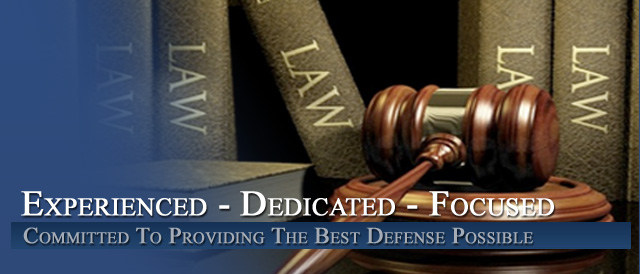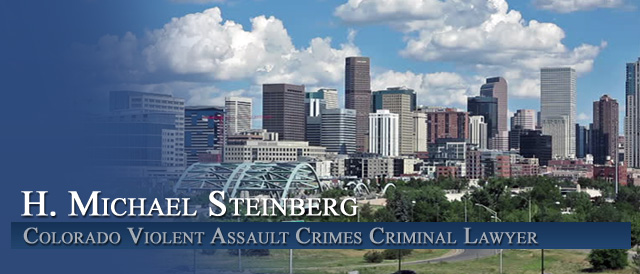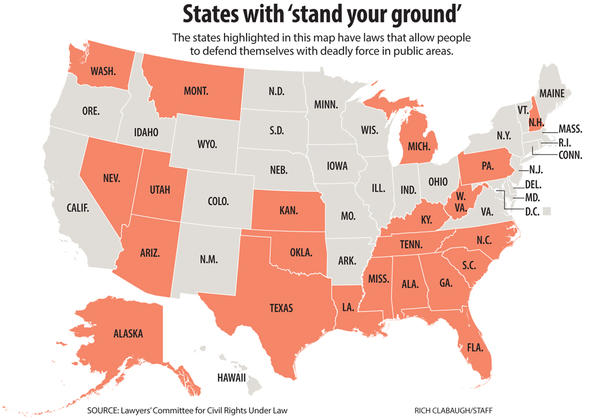





Colorado Criminal Self Defense Law – Make My Day Law – NOT A Stand Your Ground Law
By H. Michael Steinberg Colorado Violent Crimes Criminal Defense Law
Colorado Criminal Self Defense Law – Make My Day Law Is NOT Stand Your Ground Law – Colorado is not one of the states that has enacted a Florida style Stand Your Ground Self Defense Law. While Colorado passed a Make My Day home defense law in 1985, it has not yet gone so far as to pass that most expansive form of self defense law – the Stand Your Ground Law.
When the jury in the State of Florida vs. George Zimmerman found that Zimmerman was not engaged in an unlawful activity because he was attacked in a place he had a right to be – they had to also find under Florida law that he had “no duty to retreat” and could therefore “stand his ground” and meet “force with force…”
As a result of that case – maybe for the first time – the country was introduced to this most extreme form of self defense law – the “Stand Your Ground” Law.
Understanding The Nature Of A “Stand Your Ground” Law
It is important to note that “Stand Your Ground” laws vary from state to state. Presently there are more than 22 variations of the “Stand Your Ground” law across the country. Before launching into an exploration of how some of the most “complete” Stand Your Ground laws function – such as Florida’s version of the law – some basic terms and phrases need to be defined.
The Castle Doctrine
The Castle Doctrine is an ancient principle of self defense law that is usually limited to real property – such as your home. In your home there is no duty to retreat. Almost every state follows the “castle doctrine” or has a form of a “defense of habitation” law.
The Duty To Retreat Doctrine
The “duty to retreat” before using deadly force. – as explained more fully below – means a law that requires a duty to retreat before using deadly force. Deadly force – under this doctrine – is allowed only as a last resort. A “duty to retreat” generally means that one cannot resort to deadly force for self-defense if you can safely avoid the risk of harm or death (by running away, for example).
Colorado has rejected the “duty to retreat” doctrine as a result of an appellate case. In the case of Idrogo v. People decided by the Colorado Supreme Court in 1991, the Court held that:
“an innocent victim of an assault is not bound to retreat before using deadly force when the use of such force is reasonable under the circumstances.” The principle that you have no duty to retreat applies regardless of the level of force you employ to defend yourself.”
Discussion – Using Deadly Force
Self Defense law permitting deadly force without retreating to the wall is nothing new. Under traditional self-defense principles, Americans, for the most part, with few exceptions, have always had the legal right to “stand their ground” and use non-deadly force to protect themselves from an attacker, as long as their use of force was reasonably necessary.
But the use of deadly force – force that can cause death or serious bodily injury – is different.
Colorado permits deadly force only in certain narrow situations. In Colorado, there is always a requirement that the amount of force used be appropriate to the situation. Under Colorado law, a person must be in fear of imminent serious bodily injury or death before that person can use deadly force to defend themselves.
But a person under Colorado law who is in fear of serious bodily injury or death need not retreat before using deadly force.
The law is codified under the affirmative defense to a charge of unlawful use of force in CRS 18-1-704.
The affirmative defense of self-defense is found in section 18-1-704 of the Colorado Revised Statutes.
That statute states, in pertinent part, as follows:
(1) … a person is justified in using physical force upon another person in order to defend himself or a third person from what he reasonably believes to be the use or imminent use of unlawful physical force by that other person, and he may use a degree of force which he reasonably believes to be necessary for that purpose.
(2) Deadly physical force may be used only if a person reasonably believes a lesser degree of force is inadequate and:
(a) The actor has reasonable ground to believe, and does believe, that he or another person is in imminent danger of being killed or of receiving great bodily injury….
Compare Colorado’s Make My Day Law
Where Colorado DIFFERS from Florida is in the grant of immunity under the No Duty To Retreat Doctrine. Colorado ONLY offers immunity from prosecution (as opposed to raising the affirmative defense of self defense at a trial) in the so called Make My Day Case.
The “Make My Day” statute creates certain additional rights of self defense. Section 18-1-704.5, C.R.S. provides that the occupant of a dwelling is justified in using any degree of physical force against a person who has unlawfully entered the dwelling, if the occupant reasonably believes that the intruder has committed, is committing or is about to commit a crime in addition to the unlawful entry and also reasonably believes that the intruder might use any physical force against any occupant.
The Colorado Make My Day Law goes further than other forms of self defense by providing for immunity from prosecution (as well as from civil liability) rather than merely establishing an affirmative defense.
Section 18-1-704.5, C.R.S. provides that the occupant of a dwelling is justified in using any degree of physical force against a person who has unlawfully entered the dwelling, if the occupant reasonably believes that the intruder has committed, is committing or is about to commit a crime in addition to the unlawful entry and also reasonably believes that the intruder might use any physical force against any occupant.
Enter The Stand Your Ground Law
Stand Your Ground laws across the country – have dramatically expanded the circumstances under which people are permitted to use deadly force.
Truly, the stand your ground law is a radical departure from traditional self defense principles. In a state that has enacted a “Florida” type version of the law, a person has NO obligation to de-escalate confrontations or walk away from a fight as an alternative to using deadly force.
Simply put – there is no duty to retreat from a self defense situation before resorting to deadly force and, unlike Colorado’s Make My Day law – the location of the altercation is no longer relevant. It is not limited to your property (your home, your office, your car etc.).
Variations Of Stand Your Ground Laws Have Been Enacted In At Least 30 States As Of 2016
Colorado is not listed – and as noted, while Colorado does not require a duty to retreat, Colorado limits the use of deadly force and is not a “Stand Your Ground” state.
The “Florida Style” Stand Your Ground Law
Florida’s “Stand Your Ground” law (Fla. Stat. 776.013), which has recently attracted much attention, reads as follows:
(3) A person who is not engaged in an unlawful activity and who is attacked in any other place where he or she has a right to be has no duty to retreat and has the right to stand his or her ground and meet force with force, including deadly force if he or she reasonably believes it is necessary to do so to prevent death or great bodily harm to himself or herself or another or to prevent the commission of a forcible felony.
The Florida law also creates the following legal presumption:
(1) A person is presumed to have held a reasonable fear of imminent peril of death or great bodily harm to himself or herself or another when using defensive force that is intended or likely to cause death or great bodily harm to another if:
(a) The person against whom the defensive force was used was in the process of unlawfully and forcefully entering, or had unlawfully and forcibly entered, a dwelling, residence, or occupied vehicle, of if that person had removed or was attempting to remove another person against that person’s will from the dwelling, residence, or occupied vehicle; and
(b) The person who uses defensive force knew or had reason to believe that an lawful and forcible entry or unlawful and forcible act was occurring or had occurred.
The key to the “presumption” of law is that it eliminates the burden of proof for a person who used deadly force. The significance of this “burden shift” means that the burden to prove that the shooter had a “reasonable fear of imminent peril of death or great bodily harm – shifts to the prosecution, who must prove the negative.
For a state to join the “Stand Your Ground” club – it’s state law state must allow a person to:
…use deadly force — that is shoot someone — anywhere the shooter has a right to be, even when there is a clear and safe opportunity to avoid a dangerous situation.
However not ALL states are this extreme – while some states permit deadly force to protect ANY property and allow a shooter to kill a person to defend property, even if no one is in physical danger, others limit that authority to certain types of property.
How A Stand Your Ground Law Actually Functions – The Legal Presumption That The Shooting Was Lawful- The Dead “Victim” Tells No Tales
Stand Your Ground legal “presumptions” most often create what is an effectively an irrefutable defense. If a victim is dead, and there are no other witnesses to contradict the stand your ground claim of self defense, the presumption forces authorities to take the shooter at his or her word, regardless of how unlikely and unsubstantiated the shooter’s version of events may be . Essentially, without eyewitnesses or essentially very strong evidence such as a video recordings of the shooting, …the shooter walks.
This amounts to a grant of immunity from prosecution entitling a shooter to a pretrial “immunity hearing” – a hearing where each party presents evidence to a judge who then determines if the shooter acted in self-defense under the Stand Your Ground law at issue.
If the judge finds it more likely than not that the defendant acted in self-defense, the case is dismissed. If the judge finds a defendant did not act in self defense – the shooter can STILL raise the defense at trial – as in the Zimmerman case.
But it is important to note that most of these cases – grounded on a true Florida style Stand Your Ground law never goes to trial – because the judge decides all factual disputes rather permit the case to proceed to trial and to a jury of one’s peers.
Attempts To Reverse The Nations Stand Your Ground Laws
There is clearly a national movement to reverse the impact of the various State’s Stand Your Ground Laws
The “movement” includes
• Returning to the duty to retreat doctrine – where self defense laws would require that a person must remove himself or herself from the situation, if possible to do so safely, before using deadly force and then clarifying that, even without a duty to retreat, judges and juries can consider the ability to retreat in determining whether the use of deadly force was necessary;
• Requiring – as Colorado does now – that deadly force only be used when reasonably necessary to prevent or end imminent danger of death or serious bodily injury to a person.
• Removing all “presumptions” of reasonableness or lawfulness… clarifying that these legal presumptions are “rebuttable” by a preponderance of the other available evidence.
• Removing the so called “criminal immunity” provisions of the Stand Your Ground law.
• Prohibiting the initial aggressor who uses deadly force from later claiming self-defense at trial.
Summary Of The Most Extreme Version Of The Stand Your Ground Law
A “Stand Your Ground” law is similar to a standard self-defense statute, in that it allows a person to use deadly force in self-defense when the person has a reasonable belief that deadly force is necessary to prevent death or serious bodily harm.
However, a true “Stand Your Ground” law greatly expands upon the historic law of self-defense.
Colorado’s “Make My Day” Law
Colorado adopted its “Make My Day” law in 1985. The law is codified at section 18-1-704.5, C.R.S. Entitled The Homeowner Protection Act, the more recognizable title the “Make My Day” law gives Colorado residents the right to shoot and kill an intruder if they believe the person intends to commit a crime and use physical force, “no matter how slight.” That extraordinary right stops at the door.
Front porches and backyards don’t count.
Colorado’s “Make My Day” law is similar to a “Stand Your Ground” law, in that both laws may be seen as expansions upon the old common law “Castle Doctrine
Colorado’s “Make My Day” law does not mention a duty to retreat. As noted above, the Colorado State Legislature has never found it necessary to state explicitly that fact in the law as no such duty exists in Colorado under the current law.
The “Make My Day” law is like the “Castle Doctrine” because it is limited to dwellings. Rather than stating that there is no duty to retreat in a dwelling, however, Colorado’s law lowers the standard for justifying the use of deadly force against an intruder in a dwelling.
Under Colorado’s law, any occupant of a dwelling may use deadly force against an intruder when the occupant reasonably believes the intruder:
(1) has committed or intends to commit a crime in the dwelling in addition to the uninvited entry, and
(2) might use any physical force, no matter how slight, against any occupant of the dwelling.
Colorado Criminal Self Defense Law – Make My Day Law – NOT A Stand Your Ground Law
If you found any of the information I have provided on this web page article helpful please click my Plus+1 or the Share buttons for Twitter and Facebook below so that others may also find it.
If, after reading this article, you have questions about your case and would like to consider retaining our law firm, we invite you to contact us at the Steinberg Colorado Criminal Defense Law Firm – 303-627-7777.
Never stop fighting – never stop believing in yourself and your right to due process of law. You will not be alone in court, H. Michael at your side every step of the way – advocating for justice and the best possible result in your case.
ABOUT THE AUTHOR: H. Michael Steinberg – Email The Author at [email protected] – A Denver Colorado Criminal Defense Lawyer – or call his office at 303-627-7777 during business hours – or call his cell if you cannot wait and need his immediate assistance – 720-220-2277. Attorney H. Michael Steinberg is passionate about criminal defense. His extensive knowledge and experience of Colorado Criminal Law gives him the edge you need to properly handle your case.
“A good criminal defense lawyer is someone who devotes themselves to their client’s case from beginning to end, always realizing that this case is the most important thing in that client’s life.”
 You should be careful to make a responsible choice in selecting a Colorado Criminal Defense Lawyer – and we encourage you to “vet” our firm. Over the last 30 plus years – by focusing ONLY on Colorado criminal law – H. Michael has had the necessary time to commit to the task of constantly updating himself on nearly every area of criminal law, to include Colorado criminal law and procedure and trial and courtroom practice. H. Michael works hard to get his clients the best possible results in and out of the courtroom. He has written, and continues to write, extensively on Colorado criminal law and he hopes this article helps you in some small way – Colorado Criminal Self Defense Law – Make My Day Law – NOT A Stand Your Ground Law.
You should be careful to make a responsible choice in selecting a Colorado Criminal Defense Lawyer – and we encourage you to “vet” our firm. Over the last 30 plus years – by focusing ONLY on Colorado criminal law – H. Michael has had the necessary time to commit to the task of constantly updating himself on nearly every area of criminal law, to include Colorado criminal law and procedure and trial and courtroom practice. H. Michael works hard to get his clients the best possible results in and out of the courtroom. He has written, and continues to write, extensively on Colorado criminal law and he hopes this article helps you in some small way – Colorado Criminal Self Defense Law – Make My Day Law – NOT A Stand Your Ground Law.

Other Articles of Interest:
- Self Defense Law In Colorado 18-1-704 – Do I Have To Run? – The Duty To Retreat Issue
- The Colorado Crime Of Murder In The First Degree 18-3-102
- Colorado Criminal Law – Your Conscience, A Criminal Charge, And The Decision To Retain A Lawyer
- Understanding The Fight – Mutual Combat – And Colorado Self Defense Law
- Understanding Colorado Law – If You Start A Fight – You May Not Be Allowed To Claim Self Defense














